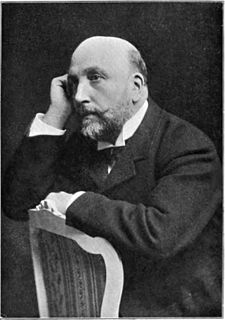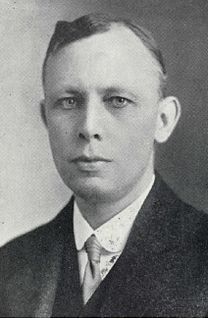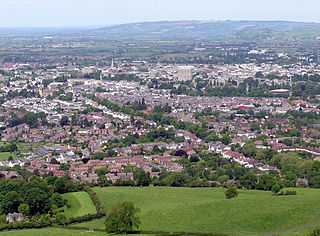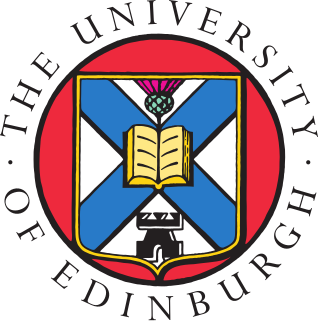
George V was King of the United Kingdom and the British Dominions, and Emperor of India, from 6 May 1910 until his death in 1936.

Oxford University Press (OUP) is the largest university press in the world, and the second oldest after Cambridge University Press. It is a department of the University of Oxford and is governed by a group of 15 academics appointed by the vice-chancellor known as the delegates of the press. They are headed by the secretary to the delegates, who serves as OUP's chief executive and as its major representative on other university bodies. Oxford University has used a similar system to oversee OUP since the 17th century. The Press is located on Walton Street, opposite Somerville College, in the suburb Jericho.

Sir Arthur Thomas Quiller-Couch was a Cornish writer who published using the pseudonym Q. Although a prolific novelist, he is remembered mainly for the monumental publication The Oxford Book Of English Verse 1250–1900 and for his literary criticism. He influenced many who never met him, including American writer Helene Hanff, author of 84, Charing Cross Road and its sequel, Q's Legacy. His Oxford Book of English Verse was a favourite of John Mortimer's fictional character Horace Rumpole.

Sir Paul Gavrilovitch Vinogradoff, FBA was a Russian and British historian and medievalist.
Henry Watson Fowler was an English schoolmaster, lexicographer and commentator on the usage of the English language. He is notable for both A Dictionary of Modern English Usage and his work on the Concise Oxford Dictionary, and was described by The Times as "a lexicographical genius".

Albert Venn Dicey, KC, FBA, usually cited as A. V. Dicey, was a British Whig jurist and constitutional theorist. He is most widely known as the author of Introduction to the Study of the Law of the Constitution (1885). The principles it expounds are considered part of the uncodified British constitution. He became Vinerian Professor of English Law at Oxford and a leading constitutional scholar of his day. Dicey popularised the phrase "rule of law", although its use goes back to the 17th century.
Her Majesty's Solicitor General for Scotland is one of the Law Officers of the Crown, and the deputy of the Lord Advocate, whose duty is to advise the Scottish Government on Scots Law. They are also responsible for the Crown Office and Procurator Fiscal Service which together constitute the Criminal Prosecution Service in Scotland.

Sir Alexander Campbell Mackenzie KCVO was a Scottish composer, conductor and teacher best known for his oratorios, violin and piano pieces, Scottish folk music and works for the stage.

Herbert Albert Laurens Fisher was an English historian, educator, and Liberal politician. He served as President of the Board of Education in David Lloyd George's 1916 to 1922 coalition government.

Hugh Chisholm was a British journalist, and editor of the 10th, 11th and 12th editions of the Encyclopædia Britannica.
Sir John Arthur Ransome Marriott was a British educationist, historian, and Conservative Member of Parliament.
James Moffatt (1870-1944) was a Scottish theologian and graduate of Glasgow University.
Robert Henry Charles, (1855–1931) was an Irish biblical scholar and theologian. He is known particularly for English translations of apocryphal and pseudepigraphal works, and editions including Jubilees (1895), the Book of Enoch (1906), and the Testaments of the Twelve Patriarchs (1908) which have been widely used. He wrote the articles in the 1911 Encyclopædia Britannica attributed to the initials "R. H. C."
Leonard Hodgson was an Anglican priest, philosopher, theologian, historian of the early Church and Regius Professor of Divinity at the University of Oxford from 1944 to 1958.
William Warwick Buckland, M.A., LL.D. was a scholar of Roman law, Regius Professor of Civil Law at the University of Cambridge from 1914 to 1945.

Kirsopp Lake was a New Testament scholar and Winn Professor of Ecclesiastical History at Harvard Divinity School. He had an uncommon breadth of interests, publishing definitive monographs in New Testament textual criticism, Greek palaeography, theology, and archaeology. He is probably best known for the massive five-volume work The Beginnings of Christianity—an edition, translation, commentary, and study of the Acts of Apostles—that he conceived and edited with F. J. Foakes-Jackson.

Northern Command was a Home Command of the British Army from 1793-1889 and 1905-1972.
Walter Alison Phillips was an English historian, a specialist in the history of Europe in the 19th century. From 1914 to 1939 he was the first holder of the Lecky chair of History in Trinity College, Dublin. Most of his writing is in the name of W. Alison Phillips, and he was sometimes referred to as Alison Phillips.

Music of Scotland in the nineteenth century includes all forms of music production in the period, in Scotland or by Scottish people.
Sidney Nowell Rostron was a Church of England priest, theologian, and academic. He was the first Principal of St John's College, Durham, serving from 1909 to 1911. He then returned to parish ministry and was vicar of a number of parishes. During World War I, he served with the Army Chaplains' Department as a military chaplain. From 1928 to 1942, he was additionally Whitehead Professor of Pastoralia at the London College of Divinity.



















